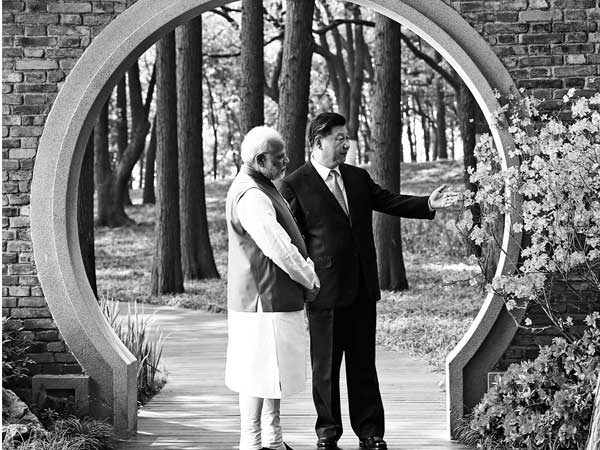
The outcome of prime minister Narendra Modi's two day visit to Wuhan for an informal summit with Xi Jinping symbolises the strength of the former’s leadership. When leaders of global stature meet in the backdrop of strained relationships they do not carry an agenda paper with them - they interact with a deep understanding of the ‘environ’ in which they were meeting and with a confidence that they alone could reset the strategy of bilateral ties. The Chinese president himself now regarded as no less than Mao Ze Dong knew that he was dealing with the most powerful leader India had produced so far. What is more important he must not have forgotten the hospitality and personal warmth Modi had shown to him during his three-day visit to Ahmadabad in 2014. He must have rightly assessed that the present Indian prime minister was a man of both head and heart who kept his own counsel and could be trusted with whatever commitment India would make in his regime. Xi Jinping replicated the personal touches he had himself experienced in India - this in fact became the highlight of Wuhan ‘summit’- and somewhere reiterated his earlier view that India-China relations were conditioned by their ‘cultures’ - going beyond the political dimensions of a Communist State and a Democratic Republic. The visit has produced a turn around in the sense that a totally negative outlook has been tempered with damage control and a successful exploration of the turf for possible cooperation.
As far as the awareness of the global ‘environ’ is concerned it would be correct to presume that president Xi Jinping’s present disposition was that of a leader who would not want any serious distraction from his vision of making China a super power through the economic route. Xi is cognisant of the new level of US-India strategic partnership that had shaped India’s policy of fully cooperating with US, Japan and Australia to keep Indo- Pacific maritime zone secure for safeguarding its own vital interest in the Indian Ocean. The Chinese president in all probability also accepts the reality that Sino-Pak axis was becoming an investment of diminishing returns for China. Prime Minister Modi on his part would have noticed that the world opinion - now firmly against Pakistan for the latter’s image as a breeding ground of Islamic terror - was dampening the advocacy of China for its ally in international forums. The prime minister would have legitimately surmised that the strong-willed response of India on Doklam would make China avoid giving one-sided provocation on the border -unlike what it did before - and would have intuitively believed that the politically non-controversial agenda of mutually beneficial trade would attract Xi Jinping. The outcome of the Wuhan summit has validated most of these readings.
While acceptance of a policy of restraint on the border by both sides and a positive approach to the building of economic relations between the two countries emerge as major gains of the interaction between the two leaders, what clearly comes out as a master stroke for India is the acceptance by prime minister Modi of a joint India- China project of contributing to the economic development of Afghanistan. China was using Pakistan for getting an ingress into Afghanistan for countering a possible return of the ‘Great Game’ around this ‘geographical pivot of history’ on account of the activism of president Donald Trump against Taliban.
A deeper message that new India has given to China under the leadership of Prime Minister Modi is that this country is all for peace and development but is totally unwilling to tolerate any aggression from outside or put up with any unilateral move of a neighbour that worked against India’s interests. Modi has been quite upfront about dealing with Xi Jinping without any prejudice or diffidence and this has made an impact. He rightly believes that diplomacy is something too important to be left entirely to the hands of diplomats. The bottom line for India is not to lower the guard and steadily prepare for handling a worst case scenario. The Defence Planning Committee established under the NSA that includes the three Services Chiefs and the Defence Secretary amongst others, is a timely move to speed up the process of upgrading the resources and integrated responses to any situation of conflict.
Mountain warfare capabilities , monitoring of the LOC as well as the Indo-Pak border and the defence of our maritime stakes in the Indian Ocean and the Indo-Pacific region at large are the obvious priorities before the DPC and it is good to see that work is already on in this direction. It is a matter of deep satisfaction that prime minister Modi has in a short period of time succeeded in consolidating the geo-political standing of India and establishing a new equation with major powers like US, Russia and China to keep Pakistan in its place and safeguard our national security. He has been able to create a fine balance between economic development and security in all bilateral relations and earn for India a new respect as a growing economic power, which was also an active advocate of world peace.
(The writer is a former director of Intelligence Bureau)





